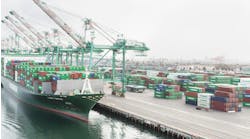Download this article in PDF format.
As companies continue to leverage technology, digitalize their operations and work more efficiently, some of them are falling behind the curve on the automation front. In a new report, JAGGAER says that while suppliers recognize the value in automating, many have yet to make the necessary investments in it. In fact, just 9% of suppliers say they’re now “fully automated” across the business-to-business (B2B) commerce experience.
According to JAGGAER, companies view “responding to requests for proposals (RFPs)” (43%) and “invoice management and collection” (43%) as the most valuable processes to automate. However, it says progress in transforming these areas appears to be slow, with 89% of suppliers saying that they have either not automated or only partially automated the RFP response process. Also, 84% have yet to automate their invoice management and collection processes.
“Organizations everywhere are revamping their supply chains in order to mitigate risk and improve resiliency,” JAGGAER’s Georg Roesch said in a press release. “Our research indicates that a lack of widespread automation on the supply side is creating inefficiencies that could stall broader progress and inhibit suppliers’ growth and performance.”
Key Findings
Among other key findings from JAGGAER’s supply side report:
- Seventy-three percent of suppliers say that shortages are having a major or severe impact on their business.
- Other top challenges include inflation (69%), workforce shortages (62%), strained production capacity (53%) and geopolitical risks (50%).
- Suppliers’ worlds are still highly manual, with the top obstacles including having to manage multiple platforms at once (65%) and manual processes and communication with buyers (39%).
- Companies surveyed admit they could advance their strategic objectives—grow their business (74%), strengthen customer relationships (72%) and increase profitability and lower costs (59%)—with the right technology and more time.
- Despite a growing emphasis on resilience and transformation, only 9% of suppliers say their commerce experience is fully automated. More than 90% say they still struggle with cumbersome or tedious processes.
Tackling Operational Challenges
Asked to reveal which specific operational challenges are holding them back right now, 65% of the companies that JAGGAER surveyed said having to manage multiple platforms at once is a major pain point. It also says that 32% of suppliers spend more than 25 hours per week responding to buyer communications and RFP and RFI requests.
“Seventy percent of suppliers say they spend more than 10 hours per week on these tasks,” JAGGAER points out in its report. “The time spent on these tasks alone costs these suppliers more than $260,000 a year.”
Other top concerns for suppliers include a lack of information and data flow between systems (for 33% of companies surveyed), limited insight into customer demand (28%), a lack of skilled personnel (17%) and limited insight into inventory (11%).
ESG and Compliance are Lesser Issues
According to JAGGAER’s report, 76% of suppliers say compliance with new and evolving regulations has had minimal to no impact on their businesses, and 68% and 65% say the same for new trade barriers and reshoring production, respectively.
Also, 64% of suppliers say that demands to be more sustainable and socially responsible have minimal to no impact. “This could indicate that suppliers feel confident in their ability to deliver on ESG initiatives,” JAGGAER points out, “and don’t view it as a top challenge for their business.”









